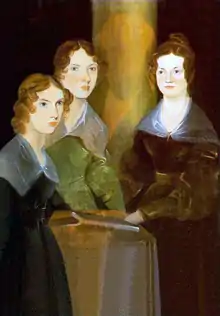To a Wreath of Snow
"To a Wreath of Snow" is a poem, written by Emily Brontë in December 1837, the same month and year Anne Brontë fell seriously ill at Roe Head and had to be withdrawn by her sister Charlotte Brontë, who was there working as a teacher.
| Wikisource has original text related to this article: |
Analysis
"To a Wreath of Snow" is Emily writing as the character Augusta Almeda, the Queen of Gondal. Gondal was a fantasy world created by Emily and Anne three years previously. The context in which this poem was written suggests that Emily was attempting to escape the reality of her sister's illness by falling back into the fantasy world they created together.
Emily describes the snow as a "transient voyager of heaven" and "angel like", suggesting that she sees the snow as coming directly from God. In addition, the fact that the poem is addressed to the snow, gives it status. This is then reinforced when she describes the mountains "crowned" in snow. When Emily was alive, royalty was seen to be chosen by God and so this imagery portrays the snow as being a gift from God. The use of "crowned" and "silvery" also presents the snow as being precious.
Sibilance is used most successfully in stanzas one and five. Emily uses sibilance to imitate the sound and atmosphere she is trying to describe. In stanza one she is imitating the "silent sign" and in stanza five she is trying to create the serene atmosphere that is "soft" and "sweetly spoke" by using the soft "s" sound repeatedly.
Emily uses punctuation throughout to emphasise her meaning. The first two lines of stanza one both begin with "O" and end with an exclamation mark which suggests that these lines are bursts of Augusta's (and therefore possibly Emily's) emotions. Emily also uses caesura in the first line in stanza four. By use of repetition and the comma in "For many a week, and many a day", Emily mimics the length she is describing.
Juxtaposition and contrasting images are used highly effectively in stanza four. Emily uses a metaphor of Augusta's heart "sinking" when the morning "rose". This creates an image that when one thing goes down something else has to go up. This could therefore suggest that to compensate for God's gift of the snow falling, Anne's life has to be a gift back to God.
